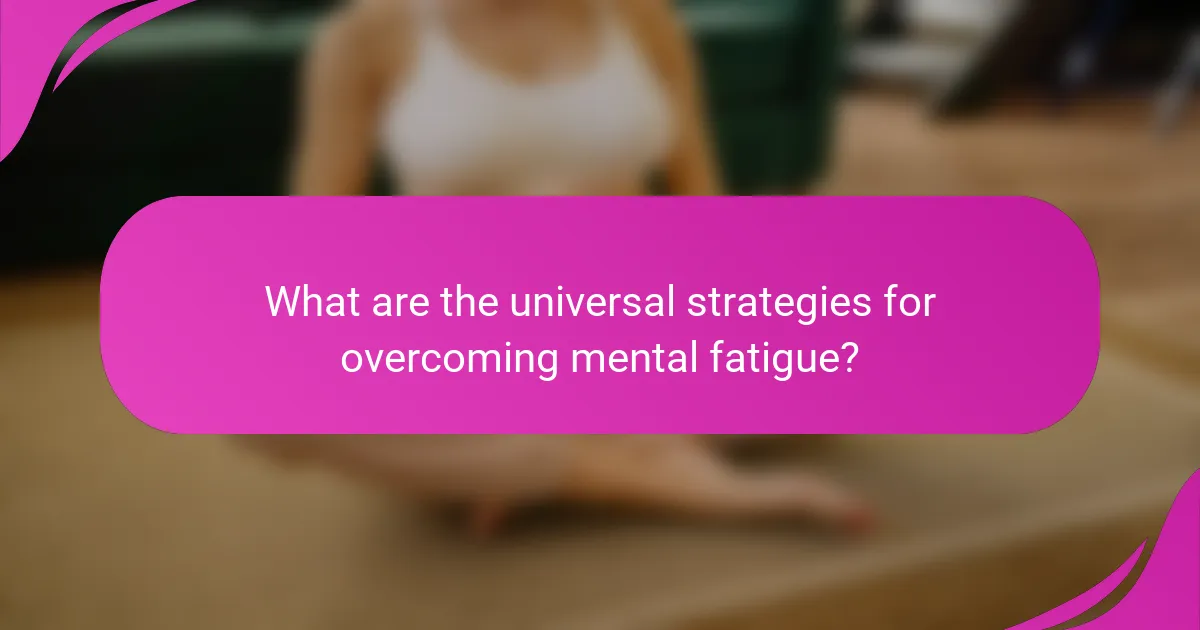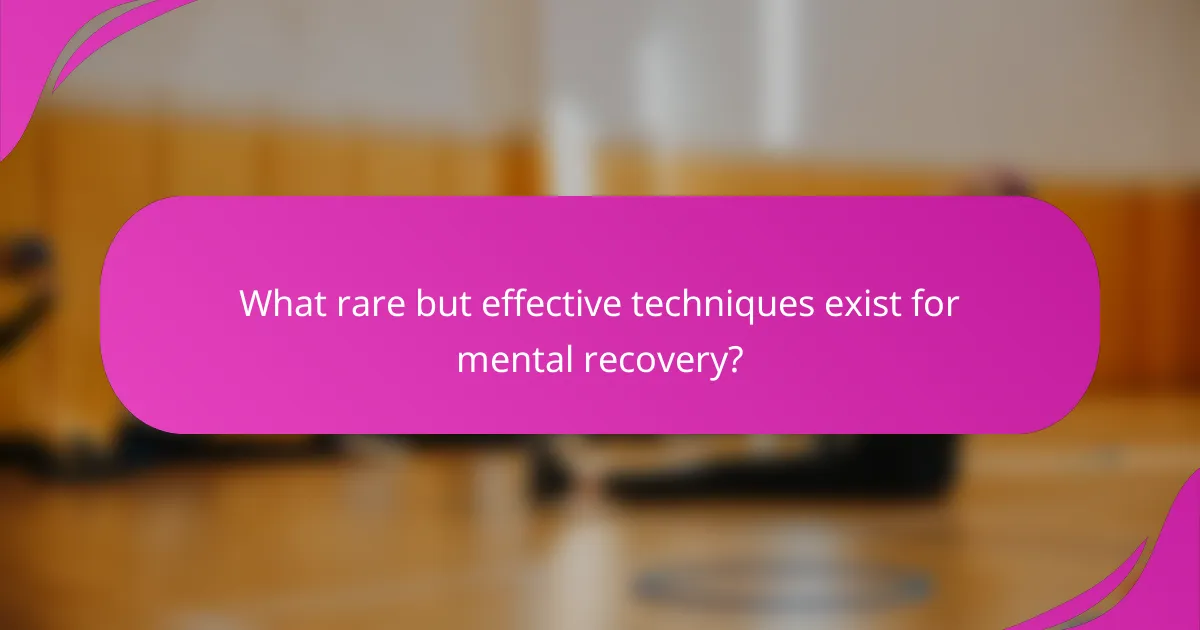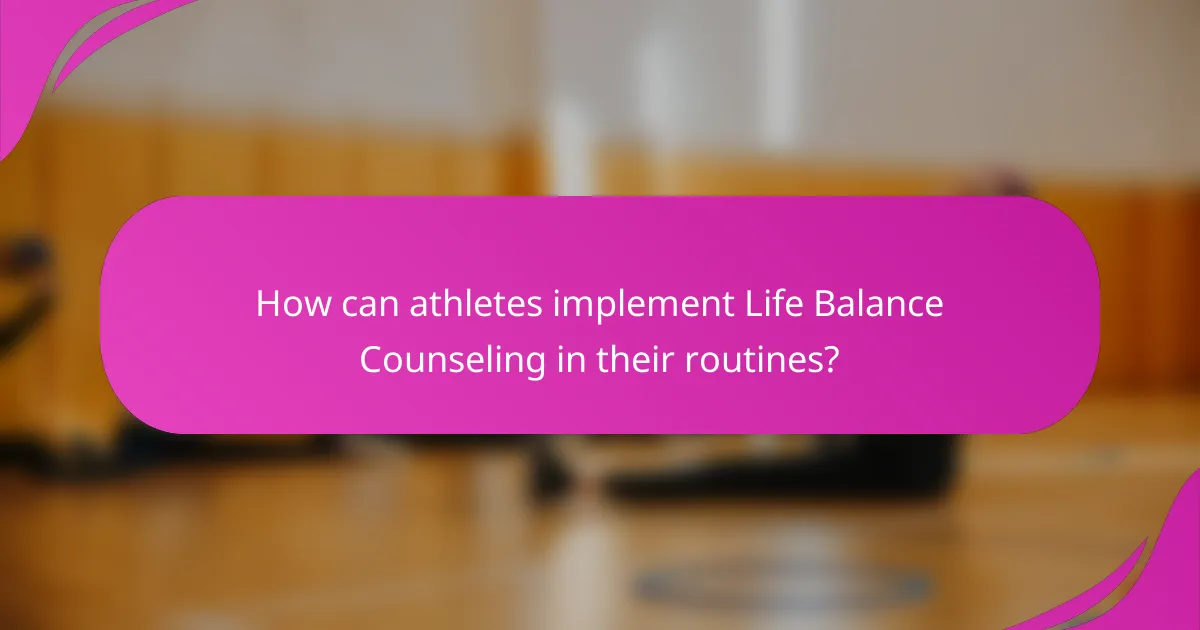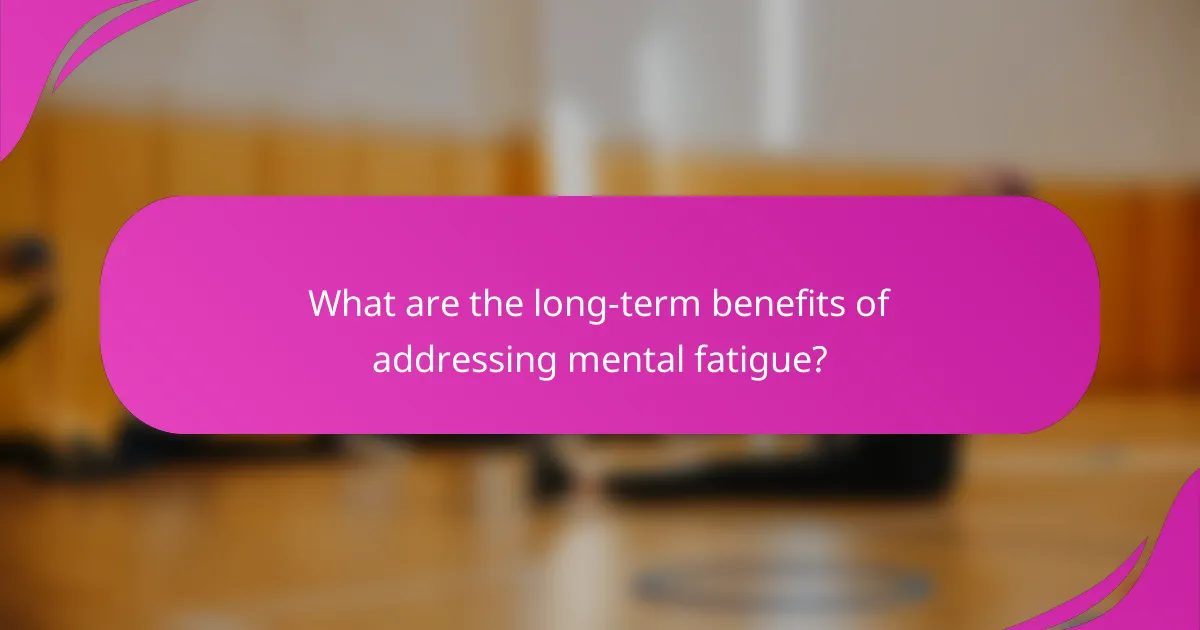Athletes often face mental fatigue that can hinder recovery and performance. Life Balance Counseling offers strategies such as mindfulness practices, goal setting, and support systems to address these challenges. This approach integrates mental health support with physical recovery techniques, enhancing overall well-being. By adopting structured mental health practices, athletes can improve focus, resilience, and emotional regulation, leading to optimal recovery outcomes.

What is Life Balance Counseling and its Role in Athletic Recovery?
Life Balance Counseling plays a crucial role in athletic recovery by addressing mental fatigue and promoting overall well-being. This approach combines psychological strategies with physical recovery techniques to enhance performance.
One key strategy involves mindfulness practices, which help athletes manage stress and improve focus. Research indicates that athletes who engage in mindfulness report lower anxiety levels and better recovery outcomes. Additionally, life balance counseling encourages goal setting, enabling athletes to create a holistic recovery plan that includes mental health, nutrition, and physical training.
Another important aspect is the integration of support systems. Athletes benefit from having a strong network of coaches, therapists, and peers who provide emotional and psychological support. This community fosters resilience, helping athletes navigate challenges during recovery.
Overall, Life Balance Counseling is essential for athletes seeking to overcome mental barriers and achieve optimal recovery, ultimately leading to enhanced performance.
How does mental fatigue affect athletic performance?
Mental fatigue significantly impairs athletic performance by reducing focus, motivation, and physical endurance. Athletes experiencing mental fatigue may struggle with decision-making, coordination, and reaction times. This decline in cognitive function can lead to suboptimal training outcomes and increased risk of injury. Strategies such as mindfulness, proper rest, and balanced nutrition can effectively mitigate mental fatigue, enhancing recovery and overall performance. Implementing these life balance counseling techniques supports athletes in maintaining mental resilience and achieving peak performance.
What are the signs and symptoms of mental fatigue in athletes?
Mental fatigue in athletes manifests through various signs and symptoms. Key indicators include decreased performance, lack of motivation, irritability, and difficulty concentrating. Physical symptoms may involve sleep disturbances and increased perceived exertion during workouts. Recognizing these signs is essential for implementing effective recovery strategies in life balance counseling.

What are the universal strategies for overcoming mental fatigue?
To overcome mental fatigue, adopt strategies that promote life balance and enhance recovery. Prioritize adequate sleep, maintain a nutritious diet, and engage in regular physical activity. Implement mindfulness practices to reduce stress and improve focus. Schedule regular breaks during tasks to prevent burnout and enhance productivity. Establish a supportive social network to share experiences and receive encouragement.
How can proper nutrition support mental recovery?
Proper nutrition significantly enhances mental recovery by providing essential nutrients that support brain function. A balanced diet rich in omega-3 fatty acids, antioxidants, and vitamins can reduce inflammation and promote cognitive clarity. For instance, studies show that foods like fatty fish, berries, and leafy greens can improve mood and decrease fatigue. Additionally, hydration plays a crucial role; even mild dehydration can impair concentration and increase feelings of fatigue. Prioritizing nutrient-dense foods can lead to improved mental resilience, facilitating better athletic recovery.
What role does sleep play in mental fatigue recovery?
Sleep plays a crucial role in recovering from mental fatigue by restoring cognitive function and emotional balance. Adequate sleep enhances memory consolidation, decision-making, and overall mental clarity. Studies indicate that sleep deprivation significantly impairs athletic performance and recovery, highlighting its importance in life balance counseling. Prioritizing quality sleep can lead to improved resilience against mental fatigue and better athletic outcomes.
How can physical training be adjusted to mitigate mental fatigue?
Adjusting physical training can effectively reduce mental fatigue by incorporating specific strategies. Focus on varying workout intensity and duration to prevent burnout. Integrate rest days and active recovery sessions, which enhance mental clarity. Prioritize mindfulness practices during training, such as deep breathing or meditation, to improve focus and reduce stress. Additionally, ensure proper nutrition and hydration to support cognitive function. These adjustments foster a balanced approach, enhancing both physical performance and mental resilience.

What unique approaches does Life Balance Counseling offer?
Life Balance Counseling offers unique, holistic strategies that integrate mental health support with athletic recovery techniques. These approaches include personalized mental resilience training, mindfulness practices tailored for athletes, and recovery-focused counseling sessions. Each method aims to enhance both mental well-being and physical performance, addressing the root causes of mental fatigue. These unique attributes distinguish Life Balance Counseling in the field of athletic recovery.
How can cognitive-behavioral techniques enhance recovery?
Cognitive-behavioral techniques enhance recovery by addressing negative thought patterns and promoting positive coping strategies. These techniques help athletes manage stress, improve focus, and boost motivation, leading to better performance and recovery outcomes. Research shows that cognitive-behavioral therapy can reduce anxiety and improve mental resilience, essential for athletic success. By integrating these techniques into life balance counseling, athletes can effectively combat mental fatigue and enhance their overall recovery process.
What is the impact of mindfulness practices on mental fatigue?
Mindfulness practices significantly reduce mental fatigue by enhancing focus and promoting relaxation. Research indicates that regular mindfulness meditation can improve cognitive performance and emotional regulation, leading to reduced stress levels. A study found that participants practicing mindfulness reported lower fatigue and higher energy levels after sessions. Additionally, mindfulness techniques foster resilience, allowing athletes to recover more effectively from both physical and mental exertion. Integrating mindfulness into recovery strategies can thus enhance overall life balance and mental well-being.

What rare but effective techniques exist for mental recovery?
Unique techniques for mental recovery include mindfulness-based stress reduction, visualization practices, and nature therapy. Mindfulness techniques enhance focus and reduce anxiety, aiding recovery. Visualization helps athletes mentally rehearse performance, improving outcomes. Nature therapy reconnects individuals with the environment, promoting relaxation and mental clarity. These methods are effective for overcoming mental fatigue and enhancing overall recovery.
How can visualization techniques improve mental resilience?
Visualization techniques can significantly enhance mental resilience by fostering a positive mindset and improving focus. These techniques allow athletes to mentally rehearse successful outcomes, reducing anxiety and enhancing performance under pressure. Research indicates that visualization can activate the same neural pathways as actual physical practice, leading to improved mental endurance. Additionally, incorporating visualization into recovery routines can help athletes mentally process experiences, promoting emotional stability and reducing mental fatigue.
What role does art therapy play in mental recovery for athletes?
Art therapy significantly aids mental recovery for athletes by fostering emotional expression and reducing anxiety. This therapeutic approach enhances self-awareness and resilience, crucial for overcoming mental fatigue. Research indicates that art therapy can lower stress levels, improve mood, and promote relaxation, which are vital for optimal athletic performance. Additionally, engaging in creative activities can serve as a unique coping mechanism, allowing athletes to process their experiences constructively.

How can athletes implement Life Balance Counseling in their routines?
Athletes can implement Life Balance Counseling by incorporating structured mental health practices into their training routines. This approach enhances recovery and reduces mental fatigue.
First, athletes should schedule regular counseling sessions to discuss stressors and develop coping strategies. These sessions can provide personalized insights into managing pressures related to competition and training.
Second, mindfulness techniques can be integrated into daily routines. Practices such as meditation or deep-breathing exercises help athletes stay present and reduce anxiety, improving overall mental clarity.
Third, establishing a balanced schedule that includes time for rest, leisure, and social interactions is crucial. This balance supports emotional well-being and prevents burnout.
Lastly, athletes can benefit from setting specific mental health goals alongside their physical training objectives. Tracking progress in both areas fosters a holistic approach to their overall performance and recovery.
What are the best practices for integrating counseling into training?
Integrating counseling into training enhances mental resilience and recovery. Best practices include establishing a supportive environment, incorporating mental health education, and scheduling regular counseling sessions.
Encourage open communication between athletes and counselors to foster trust. Utilize goal-setting strategies to align mental wellness with athletic performance. Implement mindfulness techniques to reduce mental fatigue and enhance focus during training.
Finally, evaluate the effectiveness of counseling integration through feedback and performance metrics to ensure continuous improvement.
What common mistakes should athletes avoid in their recovery journey?
Athletes should avoid neglecting rest, ignoring nutrition, and skipping mental recovery practices. These mistakes hinder athletic recovery and can lead to burnout. Prioritizing a balanced approach enhances both physical and mental well-being. For example, integrating mindfulness can improve focus and reduce stress.
How to create a balanced schedule that includes counseling?
To create a balanced schedule that includes counseling, prioritize mental health alongside athletic commitments. Integrate counseling sessions into your weekly routine, ensuring they align with training and recovery periods.
Consider the following strategies:
1. Set specific times for counseling, treating them as non-negotiable appointments.
2. Balance physical training with mental wellness activities, such as mindfulness or relaxation techniques.
3. Use a planner to visualize both athletic and counseling commitments, ensuring adequate rest and recovery.
By maintaining this balance, you enhance mental resilience and optimize athletic performance.
What resources are available for athletes seeking counseling?
Athletes seeking counseling can access various resources tailored to their needs. Professional counseling services, sports psychologists, and mental health hotlines offer support. Additionally, online platforms provide virtual therapy options. Many athletic organizations also have dedicated mental health programs. These resources enhance mental resilience and promote recovery.

What are the long-term benefits of addressing mental fatigue?
Addressing mental fatigue offers long-term benefits that enhance overall well-being and athletic performance. Improved focus, increased resilience, and better emotional regulation are key outcomes. Regular mental fatigue management can lead to sustained energy levels, enabling athletes to train effectively and recover faster. Enhanced cognitive function supports strategic decision-making during competitions, while reduced stress levels contribute to a healthier mindset. Ultimately, these benefits foster a balanced life, promoting both mental and physical health.
How does mental recovery impact overall athletic longevity?
Mental recovery significantly enhances athletic longevity by preventing burnout and injuries. Effective mental recovery strategies, such as life balance counseling, promote emotional resilience and cognitive clarity. This leads to improved focus during training and competitions. Athletes who prioritize mental well-being often experience longer careers and better performance consistency. Research indicates that mental fatigue can hinder physical recovery, emphasizing the importance of addressing psychological aspects in athletic training.
What changes can athletes expect after implementing these strategies?
Athletes can expect improved mental clarity, reduced fatigue, and enhanced recovery after implementing life balance counseling strategies. These changes stem from better stress management, increased resilience, and optimized rest periods. As a result, athletes may experience heightened performance consistency and overall well-being.
How can athletes measure their mental recovery progress?
Athletes can measure their mental recovery progress through self-assessment tools, performance metrics, and psychological evaluations. Regularly tracking mood, stress levels, and sleep quality provides insights into mental fatigue. Utilizing standardized questionnaires, like the Profile of Mood States, can offer quantifiable data on emotional states. Additionally, monitoring training performance and recovery rates helps identify correlations between mental recovery and physical outcomes.